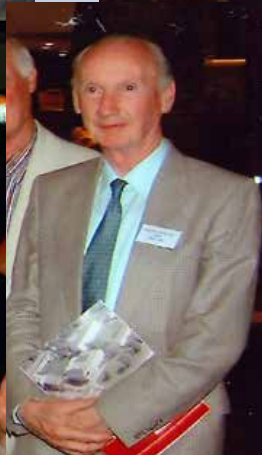Denis Grogan
 Denis Grogan died on 5 October 2024 two days before his 94th birthday. He had been a resident of the Hafan y Waun Dementia Care Home for several years. He leaves three sons and a daughter.
Denis Grogan died on 5 October 2024 two days before his 94th birthday. He had been a resident of the Hafan y Waun Dementia Care Home for several years. He leaves three sons and a daughter.
Denis was born at Bolton and educated at the Thornleigh Salesian College in Bolton and at Manchester University, where he read English. After leaving university he joined Manchester City Libraries, initially working at branch libraries in South Manchester, but afterwards moving to the Central Reference Library where he remained for more than a decade. In the early 1960s he was appointed Tutor Librarian at the newly established Stockport College of Further Education. In October 1964 Denis was one of the first four appointments to the new College of Librarianship Wales (CLW), as head of the Bibliographical Studies Department, moving to Aberystwyth in January 1965. He remained at CLW throughout its 25-year existence.
While at Aberystwyth, Denis published several successful textbooks on practical aspects of reference work and information seeking, based on his experiences in Manchester. These were reprinted in both the UK and overseas and remained the standard works on their subjects until the coming of the World Wide Web. He contributed articles to academic journals on developments in reference publishing and persistent issues in education for librarianship. He initiated the discussions between the college and the neighbouring University College of Wales at Aberystwyth to establish the first joint honours graduate qualification in librarianship together with another discipline, and the award of University of Wales postgraduate diplomas and masters’ degrees to CLW students. He also spent periods overseas in both India and Korea helping to develop library education in those countries. At the time of the merger of CLW with the University of Wales, Aberystwyth, in 1989, Denis took early retirement only to be ‘bought back’ by the University on a part-time teaching contract.
Denis was an excellent teacher, examiner and Head of Department who was regarded as a ‘wise counsellor’ by colleagues as he always knew the regulations inside out. His consummate skill was in the way in which he handled the occasionally fractious Departmental Meetings. He would calmly hold his peace until everyone had had their say and then come in with some pithy or apposite point to demonstrate why the proposal under discussion was either worthwhile, had been tried and rejected several years before, or was otherwise not properly thought through.
Dr D A Stoker
October 2024
